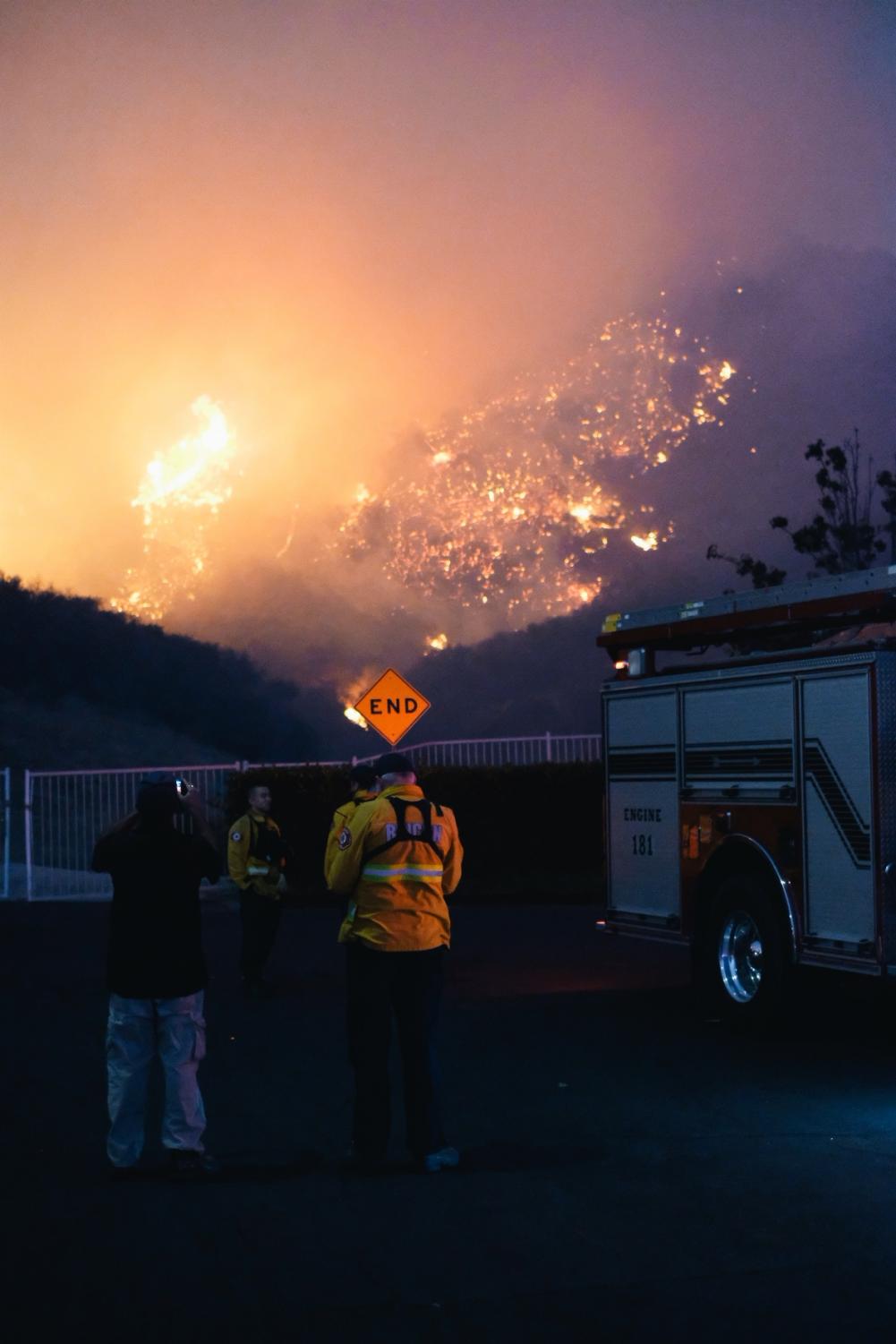This story was originally published in print on Nov. 15, 2018.
If your house was on fire, what one thing would you save? For senior business administration major Dominic Ariondo, this question became more than a mere thought experiment. Ariondo is one of 200,000 Southern California residents who have been forced to evacuate their homes in the face of deadly wildfires. Two fires, the Woolsey Fire and the smaller Hill Fire, have burned over 100,000 acres across Los Angeles and Ventura since Thursday, per the Los Angeles Times.
Ariondo, who lives in Thousand Oaks, says those in his area were blindsided by the Woolsey fire, which started within 24 hours of the deadly mass shooting at Thousand Oaks’ Borderline Bar & Grill. Seeing houses in his otherwise quiet community caught up in flames and broadcasted on the news made Ariondo realize the danger posed to his neighborhood.
“I’ve never seen anything this deadly or powerful,” Ariondo said, “[When I go back,] it’s going to be crazy just to see everything just gone and just smoky and ashy. It’s going to look totally different. I don’t really know what to expect, honestly.”
He stayed up all night on Thursday to watch the news, not wanting to wake up and hear that his house had been the next one to burn down.
“[I felt] a little bit of fear. Almost denial, too, because I’m not there. I just see pictures of what’s happening—and video,” Ariondo said.
TOO CLOSE FOR COMFORT
For senior art major Brandon Steadman, the seriousness of the situation struck him while he was at a photoshoot in LA. He remembers receiving a phone call from his mother, who was upset and alone in the Steadmans’ home in West Hills, about 15 miles from Thousand Oaks.
“And she was like, ‘I need you. We need to pack up,’” Steadman said. “That was kind of when I realized—this isn’t just a fire going on. This is getting too close for comfort.”
Steadman returned home Tuesday night to find familiar places ravaged by the flames, such as the park where he would go to shoot photos, places he would go hiking and even houses two doors down from his own.
In the evacuation, Steadman was forced to leave behind hundreds of his art pieces in his parents’ garage. He says he grabbed his cameras, photo negatives and some family photos, having to decide in an instant what was important enough to save.
“You’re just kind of realizing what really matters to you,” said Steadman.
Steadman had originally planned to stay behind and fight the fire with his father, but he eventually decided to leave the job to the firefighters.
It was a “really weird” feeling, he said, because as 50-mile-per-hour winds pushed the fire suddenly and unpredictably he was powerless to stop the blaze.
Associate professor of journalism Stew Oleson lives in Pacific Palisades, which borders fire-burdened Malibu. He describes a similar feeling, one of reflection.
“You feel very small, and it gives you a chance to reflect on being in control,” Oleson said. “You become very reflective about it and what’s important to you.”
LOOKING FORWARD TO RECOVERY
Steadman and Ariondo’s families have been cleared to return home, but life moving forward takes a different tone after the scare. While Ariondo’s home survived, it bears the marks of the fire-damaged community. He estimates that it may take three weeks to a month of cleaning before everything at home goes back to normal.
Steadman says that even though he is at school, life is still “kind of weird.”
“It’s just hard ‘cause I’m even further away from it. There’s no smoke here, but then it’s like, I’m seeing everyone talk about it,” Steadman said.
Steadman’s professors, he says, have been gracious to late assignments, taking his circumstances into account.
COMMUNITY INVOLVEMENT
Dean of Spiritual Development Todd Pickett is helping lead efforts to support students who are from affected areas. The department has been reaching out and offering pastoral care, emotional support and academic accommodation to students like Steadman who have had to delay homework or miss tests.
For students who come in for pastoral care, Pickett says it gives them a chance to process what they are experiencing. Pastoral care staff asks how students are emotionally affected, and gives them someone to sit with.
“I think we underestimate the power of presence. People don’t always want you or expect a fix to something that is deeply emotional because they know that there is no quick fix,” Pickett said. “But it’s a great gift to listen to someone, to be present with them, to talk through and give them a chance to express their concerns, fears, and then, of course, to pray for them.”
That process of growth may take longer than most people expect, Pickett believes.
“It is good to continue to be aware of the needs in the longer run… This will not be a quick recovery for anyone,” Pickett said.
Despite this week’s harrowing events, Steadman and Ariondo felt surprising calmness.
“The stuff on this world doesn’t matter,” Steadman said. “That was something I was thinking when I was packing up. I was like, ‘Oh, this doesn’t matter, this doesn’t matter. Yeah, I want to hold on to this.’ But just trusting in God was a lot harder because I couldn’t control [the fire].”











